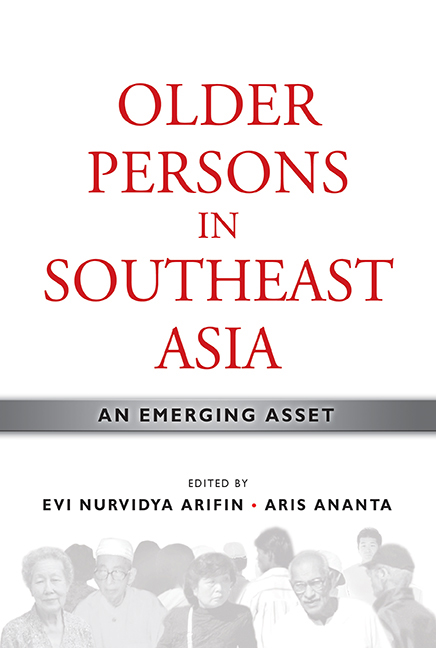Book contents
- Frontmatter
- Contents
- List of Tables
- List of Figures
- Foreword by Hal Hill
- Message from the Director
- Preface
- Contributors
- PART I INTRODUCTION
- PART II OLD-AGE INCOME SECURITY
- PART III EMPLOYMENT AND OTHER SOURCES OF FINANCIAL CONTRIBUTION
- 7 Employment of Older Persons: Diversity across Nations and Subnations in Southeast Asia
- 8 Work, Income, and Expenditure: Elderly and Near-elderly Women in Metro Cebu, Philippines
- 9 Employability Approach to Financing Old Age
- 10 Facing the Geriatric Wave in Indonesia: Financial Conditions and Social Support
- PART IV AGEING, MIGRATION, AND DEVELOPMENT
- PART V ROLES OF GOVERNMENT AND CIVIL SOCIETY
- Index
9 - Employability Approach to Financing Old Age
from PART III - EMPLOYMENT AND OTHER SOURCES OF FINANCIAL CONTRIBUTION
Published online by Cambridge University Press: 21 October 2015
- Frontmatter
- Contents
- List of Tables
- List of Figures
- Foreword by Hal Hill
- Message from the Director
- Preface
- Contributors
- PART I INTRODUCTION
- PART II OLD-AGE INCOME SECURITY
- PART III EMPLOYMENT AND OTHER SOURCES OF FINANCIAL CONTRIBUTION
- 7 Employment of Older Persons: Diversity across Nations and Subnations in Southeast Asia
- 8 Work, Income, and Expenditure: Elderly and Near-elderly Women in Metro Cebu, Philippines
- 9 Employability Approach to Financing Old Age
- 10 Facing the Geriatric Wave in Indonesia: Financial Conditions and Social Support
- PART IV AGEING, MIGRATION, AND DEVELOPMENT
- PART V ROLES OF GOVERNMENT AND CIVIL SOCIETY
- Index
Summary
Globalization has generated many controversies because it affects different countries differently. Even for countries that benefit significantly from globalization, some industries will gain and others will suffer. This is because under globalization the more efficient sectors — the export sectors — will grow and employ more workers, and the less efficient sectors — the import sectors — will shrink and retrench workers. Hence, while increase in employment in some sectors may be noticeable, the media, the public, and certainly the retrenched workers, will make known to the country the plight of the retrenched workers. The nightmare of globalization to developed countries is outsourcing. Because of technology, jobs are exported out in return for a higher rate of return to the corporate sector without any benefit to local employment.
As Stiglitz (2004) puts it, the Americans, the long-time champions of globalization, seem concerned about its adverse effects on their economy. Globalization is here to stay and the debate on globalization will linger on. The best way to cope with globalization is to build a series of labour market mechanisms that mitigate the adverse effects from globalization while taking advantage of its benefits.
Not surprisingly, Singapore is also affected by globalization. The Gini coefficient for the economy increased from 0.44 in 1990 to 0.49 in 2000 and to 0.52 in 2005 (Chew and Chew 2007) indicating that the income gap in Singapore has worsened. This is inevitable, as low-income Singaporeans compete with workers from developing countries; hence their incomes will not rise unless there is productivity gain. On the other hand, high-income Singaporeans compete with professionals in the developed countries; hence their incomes will rise in tandem with the rise in salaries in the United States and Europe. Also, due to the relocation of plants to lower-cost countries such as China and Vietnam, the unemployment rate was high during 2000–03. Singapore' approach to the problem of the rising income gap is multifold: (i) continue to provide incentives for high-income professionals to work in Singapore (while not raising the income tax rate); (ii) use fiscal policies to help low income Singaporeans; iii) manage wage cost so that firms can retain workers without resorting to retrenchment; (iv) train workers; and (v) redesign jobs for the local unemployed. Hence, Singapore' approach is to enhance employability where possible.
- Type
- Chapter
- Information
- Older Persons in Southeast AsiaAn Emerging Asset, pp. 244 - 269Publisher: ISEAS–Yusof Ishak InstitutePrint publication year: 2009

